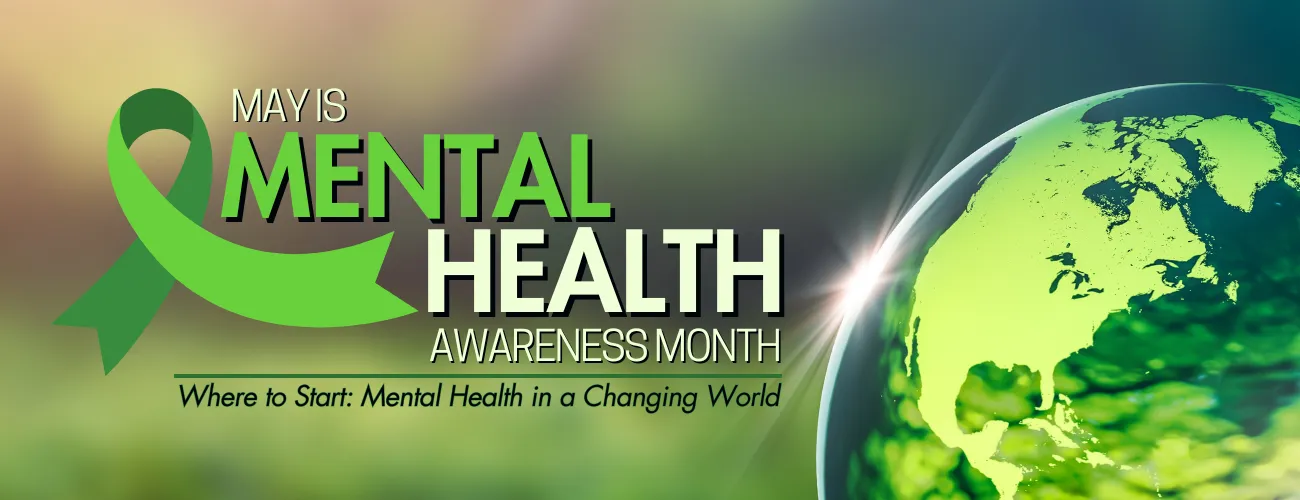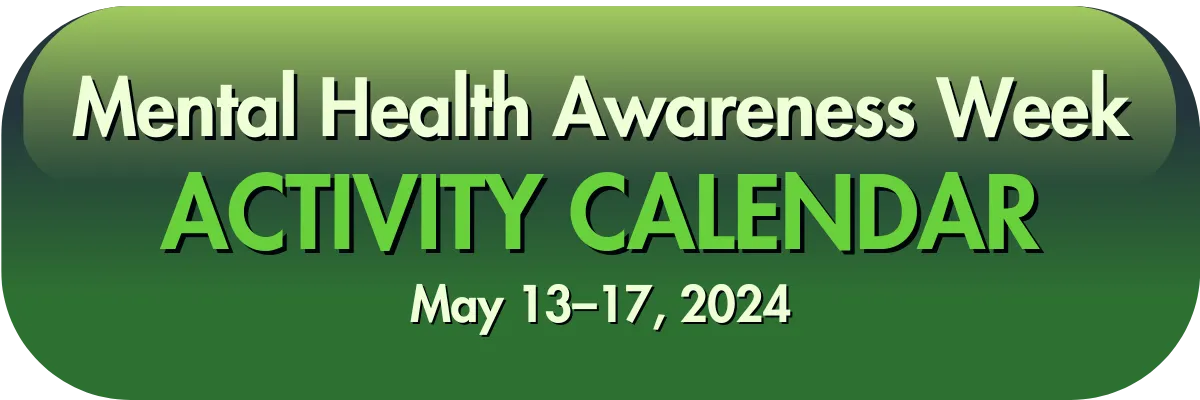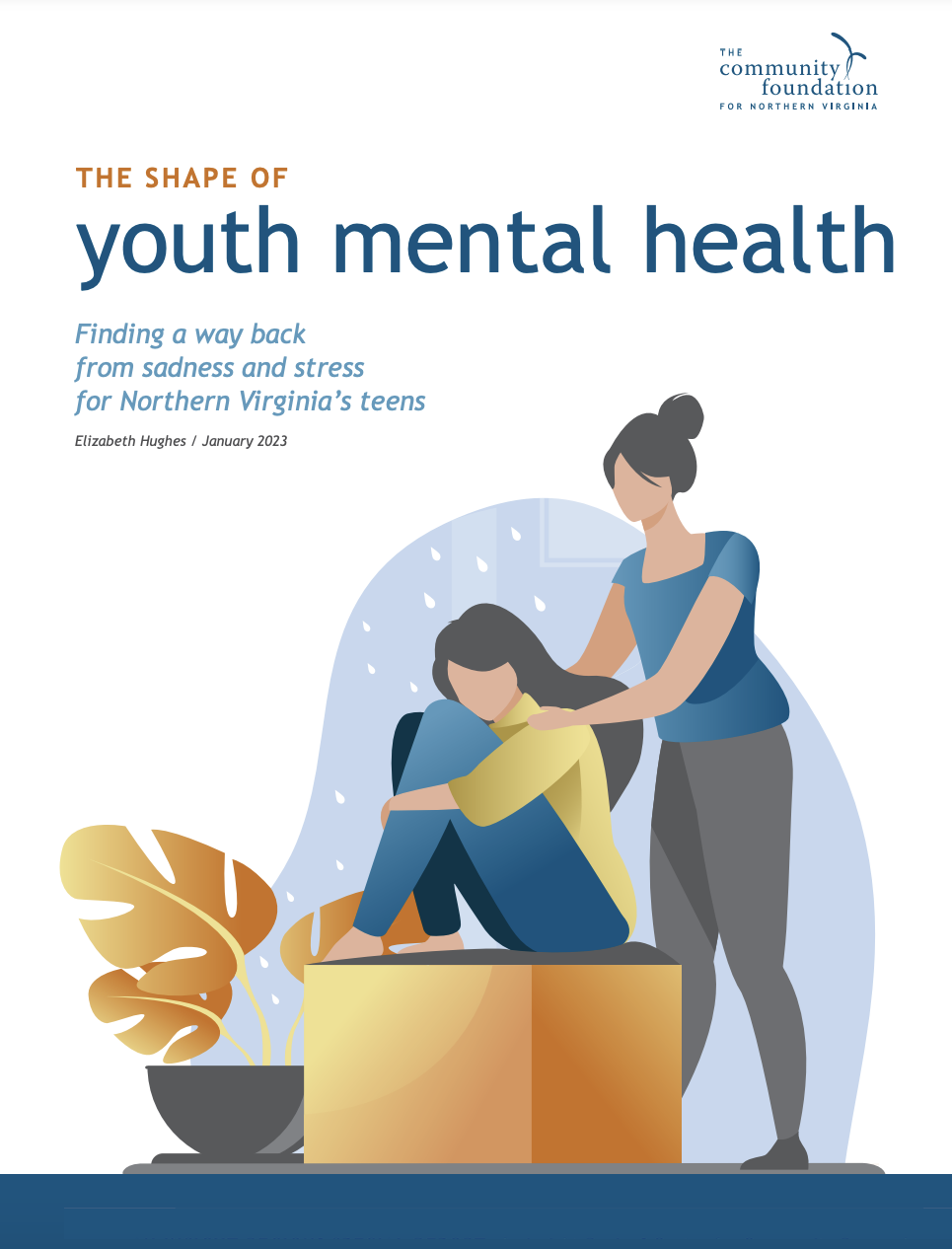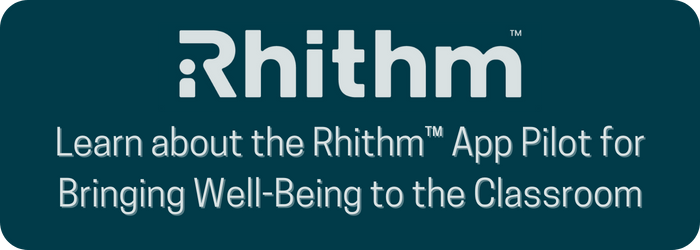
May is Mental Health Awareness Month
In partnership with Mental Health America, PWCS recognizes May as Mental Health Awareness Month and is dedicated to recognizing the importance of mental health and its impact on our lives. This year's message is "Where to Start: Mental Health in a Changing World." Navigating the ever-changing world can be challenging, especially when it comes to prioritizing mental health. It is difficult to deal with life's challenges, and everyone deserves to be supported and empowered to seek help when needed. While society is getting more comfortable discussing mental health, it can still be hard to know #WhereToStart when it comes to taking care of ourselves.
Throughout May, various events and initiatives to raise awareness are taking place in our schools to encourage self-care and connect with resources. Families are encouraged to participate in these activities and use the available resources to support one another.

Fast Facts
- 1 in 5 U.S. adults experience mental illness each year
- 1 in 20 U.S. adults experience a serious mental illness each year
- 1 in 6 U.S. youth aged 6–17 experience a mental health disorder each year
- 50% of all lifetime mental illness begins by age 14, and 75% by age 24.
- Suicide is the 2nd leading cause of death among people aged 10–14
- People with depression have a 40% higher risk of developing cardiovascular and metabolic diseases than the general population
- High school students with significant symptoms of depression are more than twice as likely to drop out compared to their peers
- 1 in 5 young people report that the pandemic had a significant negative impact on their mental health.
- Students aged 6-17 with mental, emotional or behavioral concerns are 3x more likely to repeat a grade.
Retrieved from National Alliance on Mental Health
Source: Data from CDC, NIMH and other select sources.
Find citations at nami.org/mhstats
Parent Resources
Fact Sheet
Know the Signs: Recognizing Mental Health Concerns In Kids and Teens (PDF)
Articles
- Outdoor Light Linked with Teens' Sleep and Mental Health–National Institute of Mental Health (NIMH)
- Things You Can Do to Improve Your Child's Mental Health–Verywell Family
- Social Media and Youth Mental Health–Current Priorities of the U.S. Surgeon General
- What Every Child Needs for Good Mental Health–Mental Health America (MHA)
- What Is Children's Mental Health?–Centers for Disease Control and Prevention (CDC)
- What to Do if You're Concerned About Your Teen's Mental Health (PDF)–The JED Foundation
- Youth Connectedness Is an Important Protective Factor for Health and Well-being–CDC
- Youth Mental Health–Current Priorities of the U.S. Surgeon General
Publications
|
|
|
Getting Started with Mental Health Treatment: What You Need to Know by Heather Moul, LCSW, School Social Worker, PWCS I think I (or my child) would like to talk to someone. What should I know? What do I do next? How do I find a therapist? Who are therapists and what do they do? If you have private insurance, call your insurance company and check for your Behavioral Health Benefits. Most people assume their medical benefits are the same as their behavioral health benefits but often they are not. Most solo or group mental health practices DO NOT check your benefits like a medical practice. Therefore, if the solo/group practice files a claim and it gets rejected you may be responsible for the full rate (self-pay or out of cost pocket) cost. Here is what to ask your insurance company about your behavioral health benefits:
If you do not have mental health benefits or have no insurance, you still have options. Contact the Community Services Board (CSB) or your local church, as some pastors provide pastoral counseling. Most mental health therapists also take self-pay, charge on sliding scale or pro bono. Another option is to contact a mental health practice and ask if they have interns on staff who charge lower fees. What are the different types of therapists who can diagnose and provide treatment for mental health disorders?
|
Toolkits for Schools
- Mental Health America
- National Alliance on Mental Illness (NAMI)
- Follow These Steps to Ease Student Anxiety in Your Classroom–Hey Teach!
Resources to Support the Mental Health of Teachers and School Staff
- Angela Watson's Truth for Teachers Podcast–Weekly podcasts providing encouragement and inspiration for teachers. Ranks in the top three K-12 podcasts in the world.–The Cornerstone for Teachers.
- Care for the Caregiver: Guidelines for Administrators and Crisis Teams–National Association of School Psychologists (NASP).
- Employee Benefits–PWCS, in coordination with our Employee Assistance Program ComPsych Guidance Resources, offers workshops and toolkits for enhanced wellbeing. May's offerings are mental health-based and June's are focused on summer fun. For links and webinar registration, visit the Employee Benefits page.
- Teacher Mental Health Tips You Can't Afford to Ignore–Teach Starter
- The Educator's Room Presents: The Teacher Self-Care Podcast–Anchor by Spotify.
- Why Teacher Self-Care Matters and How to Practice Self-Care in Your School–Waterford.org.
- Enroll in the Self-Care and Wellness Canvas Course
Webinars and Videos
| 10 Common Warning Signs of a Mental Health Condition ~National Alliance on Mental Health (NAMI)~ (YouTube Video) |
| Being More Intentional About Our Mental Health ~Mental Health America (MHA)~ (YouTube Video) |
| Engaging Youth in Safe Online Spaces to Address Mental Health Concerns ~Mental Health America (MHA)~ (YouTube Video) |
|
Where to Get Help
Where to Get Help
- Reach out to your health insurance, primary care doctor or state/county mental health authority for more resources.
- Talk with your employer about their Employee Assistance Program (EAP). These programs typically extend coverage to your immediate family members including children.
- National Alliance on Mental Illness (NAMI), Prince William Chapter, offers free support groups.
- NAMI Family Support Groups - NAMI Family Support Groups are free, confidential and safe groups of families helping other families who live with mental health challenges by utilizing their collective lived experiences and learned group wisdom.
- NAMI Connection - NAMI Connection is a weekly recovery support group for people living with mental illness in which people learn from each others’ experiences, share coping strategies, and offer each other encouragement and understanding.
- 988 - Suicide & Crisis Lifeline - Dial or text 988 if you or someone you know is having thoughts of suicide or experiencing a mental health crisis and get connected to a trained crisis counselor 24 hours a day, 7 days a week. Crisis counselors listen empathetically and without judgment. Your crisis counselor will work to ensure that you feel safe and help identify options and information about mental health services in your area.
- Crisis Text Line – Text HOME to 741741 to connect with a trained crisis counselor to receive free, 24/7 crisis support via text message.
- National Domestic Violence Hotline – Call 800-799-SAFE (7233) - Trained expert advocates are available 24/7 to provide confidential support to anyone experiencing domestic violence or seeking resources and information. Help is available in Spanish and other languages.
- National Sexual Assault Hotline – Call 800-656-HOPE (4673) - Connect with a trained staff member from a sexual assault service provider in your area that offers access to a range of free services. Crisis chat support is available.


